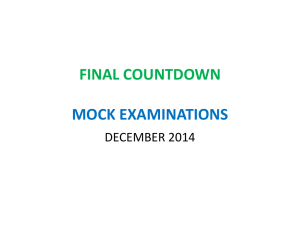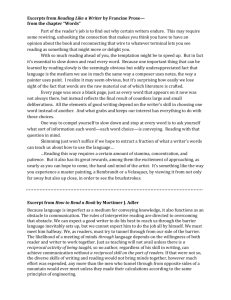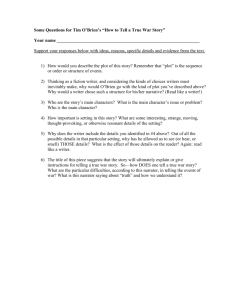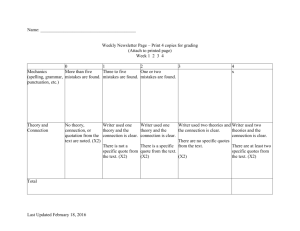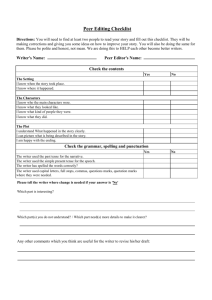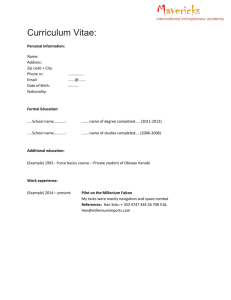My Growth as a Writer
advertisement
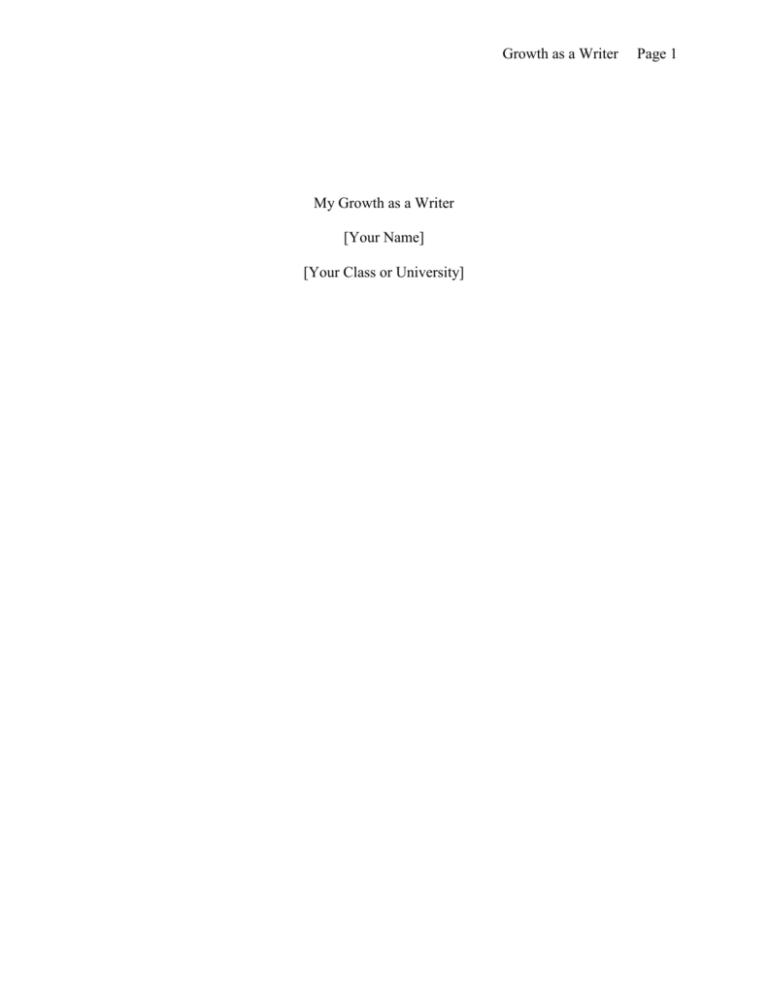
Growth as a Writer My Growth as a Writer [Your Name] [Your Class or University] Page 1 Growth as a Writer Page 2 Introduction It took me many years of English and writing classes before I realized that I was making writing much harder than it needed to be. Eventually, after enough years of classes and practice at writing, I realized that the keys to writing are simply observation and description. In order to write about a situation, first I have to observe the situation and notice all the details, especially the trivial things that stick in my mind, because they don’t fit the situation. Once I have looked at the situation and all of the details surrounding it, then the remaining task is describing what I have seen. For a long time, I found it very difficult and nearly impossible to describe a situation because I though there was some special way to write it. Finally, I realized that the best way to write was to mentally tell a friend about what I was writing about, and then write those words down. Once I realized that writing was just telling someone what I had seen or felt and then going back and cleaning up what I had written to make it more understandable and grammatical, writing became much easier. Main Body One of the first structured writing assignments that I really remember was in junior high school when my English teacher would randomly choose a topic each day and then require us to write a page-long essay about that topic. I soon found that some topics were very easy to write a page about, and other topics were nearly impossible. How could I write a page worth of words about a broom, for instance? Over the course of that year, I realized that the way to write about any topic was to carefully observe it. The closer attention I paid to an object, the more things that I could find to write about it. The deeper I looked, the easier an object was to describe. Over the years, I have learned to observe more closely and describe situations and objects more fully. The first time I tried to describe a mountain, it was just a mountain. As I looked Growth as a Writer Page 3 deeper, I could see the strata of the different types of rock that made up the mountain. I could see the clouds hanging on the top of the mountain like big cotton balls sitting on the top of the mountain. The more I looked, the more I saw and the more I could see, the more I could describe to my imaginary friend. I found that once I could describe the scene on paper to my imaginary friend, then it was easy to edit the description to correct the grammar and formalize the words that I had used. I found that the bigger and more important a situation was, the easier it was to see and remember the details that made the situation unique from anything else and that frequently the ironic details that didn’t fit the situation are the very details that I as a writer, can use to enable the reader to feel the situation rather than just read my description of it. These details are present in small, local incidents and large, national tragedies. Years ago, a local newspaper ran a front page picture of the blanket covered body of a child who had been killed in a traffic accident. The story was heart-wrenching and the picture was sad, but the detail that made the picture unforgettable was the tiny pink sneakers showing under the end of the blanket. That was the detail that ripped my guts out. Only the greatest of authors could see and write a detail like that into their writing. Two more similar examples came on September 11, 2001. This was a day of national tragedy, but it wasn’t the large events that really created the emotionalism that I will always associate with that day, but two fairly small details that stick in my mind as symbols of the whole day. One symbol was that where I was that day, the weather was beautiful. A clear, crisp fall day with a absolutely beautiful blue sky, the kind of day that begs you to play hookie and go do something fun outdoors and at the same time, on the radio I was listening to reports of thousands of people losing their lives. Growth as a Writer Page 4 Another symbol of irony occurred at the Pentagon that day. I was watching on television as the wounded on stretchers were being carried to the helicopters to be evacuated to hospitals, and I noticed that Secretary of Defense Donald Rumsfeld was helping to carry a casualty on a stretcher. He was still wearing a suit and tie. For me that showed the terror of an ordinary workday, get up, go to work, get some coffee, and suddenly a plane crashes into your building and the world changes forever with no warning. Conclusion The most important lesson that I have learned in my growth as a writer is to look for the small details, the unusual item that captures the whole story in a nutshell. The second most important lesson I have learned is that to avoid being intimidated by the act of writing, just tell a story to an imaginary friend, write it down, and then revise it as necessary.

